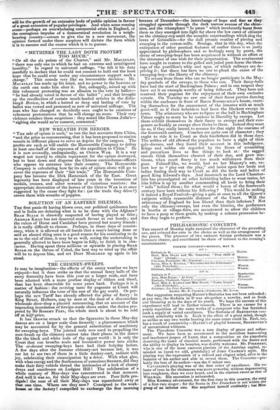THE CHIMNEY-SWEEPS.
IT may be imagination—the effects of the sunny weather we have enjoyed—but it does strike us that the annual fancy balls of the sooty fraternity have been this year on a larger scale, and have been adorned with a more profuse display of ribbon and tinsel, than has been observable for some years back. Perhaps it is a matter of fashion : the reviving taste for pageants at Court will naturally influence the tone of the rest of the gay world. Or per- haps the new Tariff has already affected the price of finery : in King Street, Holborn, may be seen at the door of a disconsolate wholesale shoe-shop a placard announcing, that on account of the impending inundation of foreign-made shoes under the duties pro- posed by Sir ROBERT PEEL, the whole stock is about to be sold off at half-price.
It has likewise struck us that the figurantes in these May-day dances are on a larger scale than formerly : a phaenomenon which may be accounted for by the general substitution of machinery for sweeping-boys. The jointed rods now used in propelling the soot-brush up the chimney cannot take their places in the dance like the black and white rods of the upper world : it is only the Court that can breathe souls and locomotive power into sticks. The ei-devant sweeping-boys have had their holyday before. A few days after the humane chimney-act became law, it was our lot to see two of them in a little donkey-cart, radiant with joy, celebrating their emancipation by a drive. With what glee, with what energy and the fearlessness of conscious freemen, did they make their fairy vehicle thread the intricacies of a lock of clumsy drays and omnibuses on Ludgate Hill The exhilaration of a whole century of May-days was concentrated in that moment. And well it was so for their May-days are over. Poor little pro- digals! the sum of all their May-days was squandered away at that one time. Where are they now ? Consigned to the work- house or the factory compelled to exchange the free morning breezes of December—the interchange of hope and fear as they struggled upwards through the dark narrow avenue of the chim- rues, and the triumphant "Jo pwan " which involutarily burst from them as they emerged into light far above the low cares of citizens on the chimney-top amid the seraphic caterwanlings which sing the loves of Grimalkin—for the dull prosaic routine of piecing and sweeping in the cotton-mills. Strange, that in this day, when the extirpation of other poetical features of earlier times is so justly appreciated by philosophers and so feelingly sung by poet; the decay of sweeping-boys has been acquiesced in without an effort or the utterance of one wish for their perpetuation. The sentimental have sought to restore to the galled and jaded post-horse the bless- ings of the postillion's whip and spur, of which railways are de- priving it ; but there has been no one to plead the cause of the sweeping-boy—the liberty of the chimney. To return from those who can no longer participate in the May- day gambols of the sweeps, to those who can. Their fancy-balls have had the start of Buckingham Palace ; and in one respect they have set it an example worthy of being followed. They have not. reserved their pageant for the enjoyment of their own exclusive coterie. On Tuesday we saw one of their finest parties dancing within the enclosure in front of Baron ROTHSCHILD'S house, exert- ing themselves for the amusement of the inmates with as much good-will as if their beholders had been the blackest sweeps in town. The aristocracy who are to figure at the ball in Buckingham Palace ought to scorn to be outdone in liberality by sweeps. Let them exhibit themselves in their finery to sweeps and their con- geners as frankly as sweeps show theirs to them. Indeed they must do so, if they really intend to assume for that night the costume of the fourteenth century. Coaches are quite out of character ; they ought to ride it to Court as their forefathers did in those days. The nobles of old allowed the populace to have a sight of their gala-dresses, and they found their account in this indulgence. Kings and nobles are regarded by the livers of scrambling and precarious lives as fine things to look at : the ragged rascals think themselves cheated of their due, and grow mu- tinous, when court finery is too much withdrawn from their gaze. Falstaff-like, we would, had we her Majesty's ear, ex- hort her to "play out the play," and insist upon her lords and ladies finding their way to Court as did the lords and ladies of good King Edward's days. And inasmuch as the Lord Chamber- lain has promulgated an edict forbidding ladies to wear trains, let him follow it up by another commanding all lords to bring their "tails" behind them ; for what would a baron of the fourteenth century have been without his following ? This would be making it indeed a Royal Festival—giving a gala at once to all the Queen's subjects within reasonable distance of the Court. Will the aristocracy of England be less liberal than their inferiors ? Not only the chimney-sweeps, but even the histrios, the performers in booths at village-fairs, are accustomed to allow the children to have a peep at them gratis, by making a solemn procession be- fore they begin to perform.


























 Previous page
Previous page